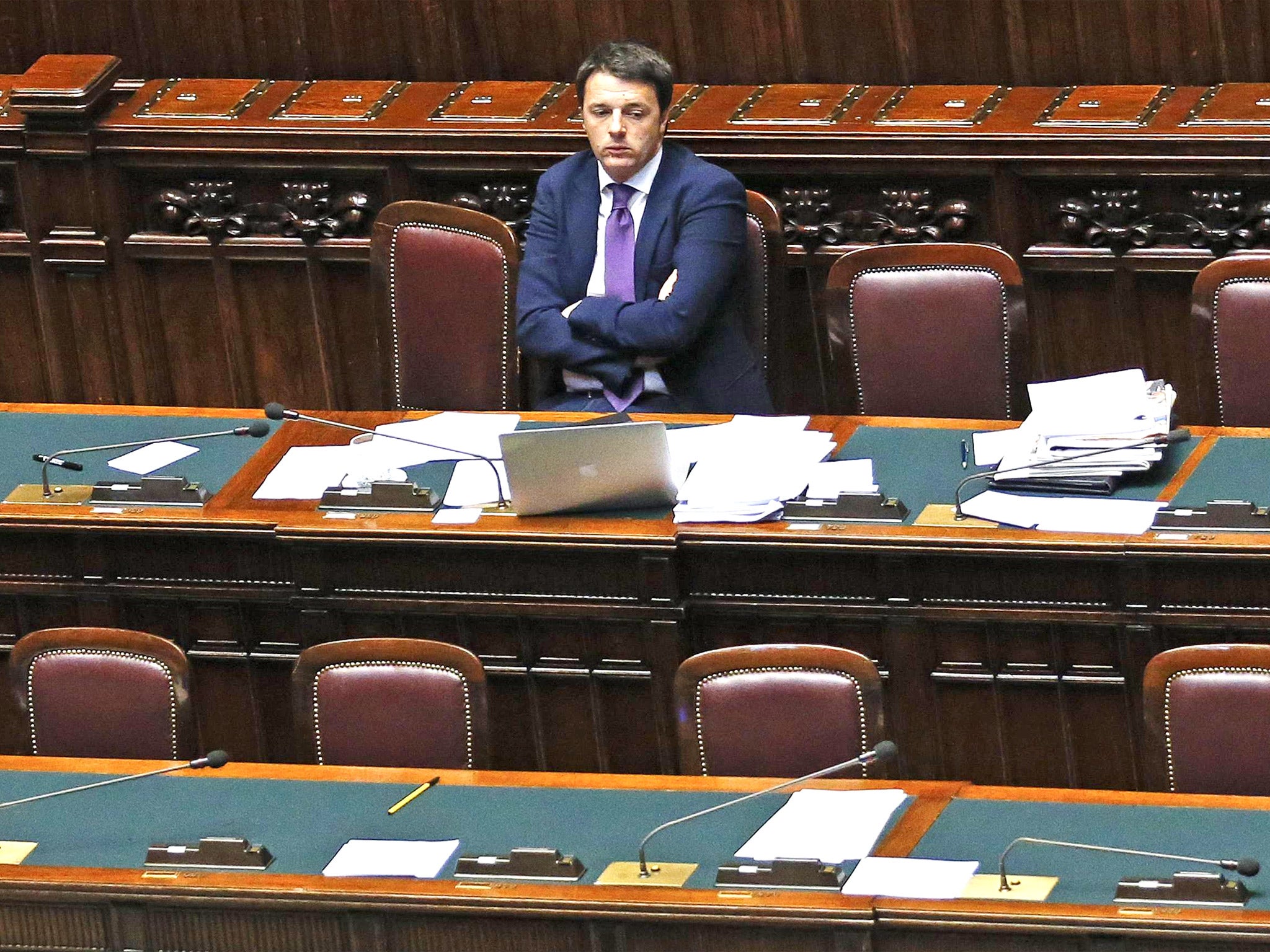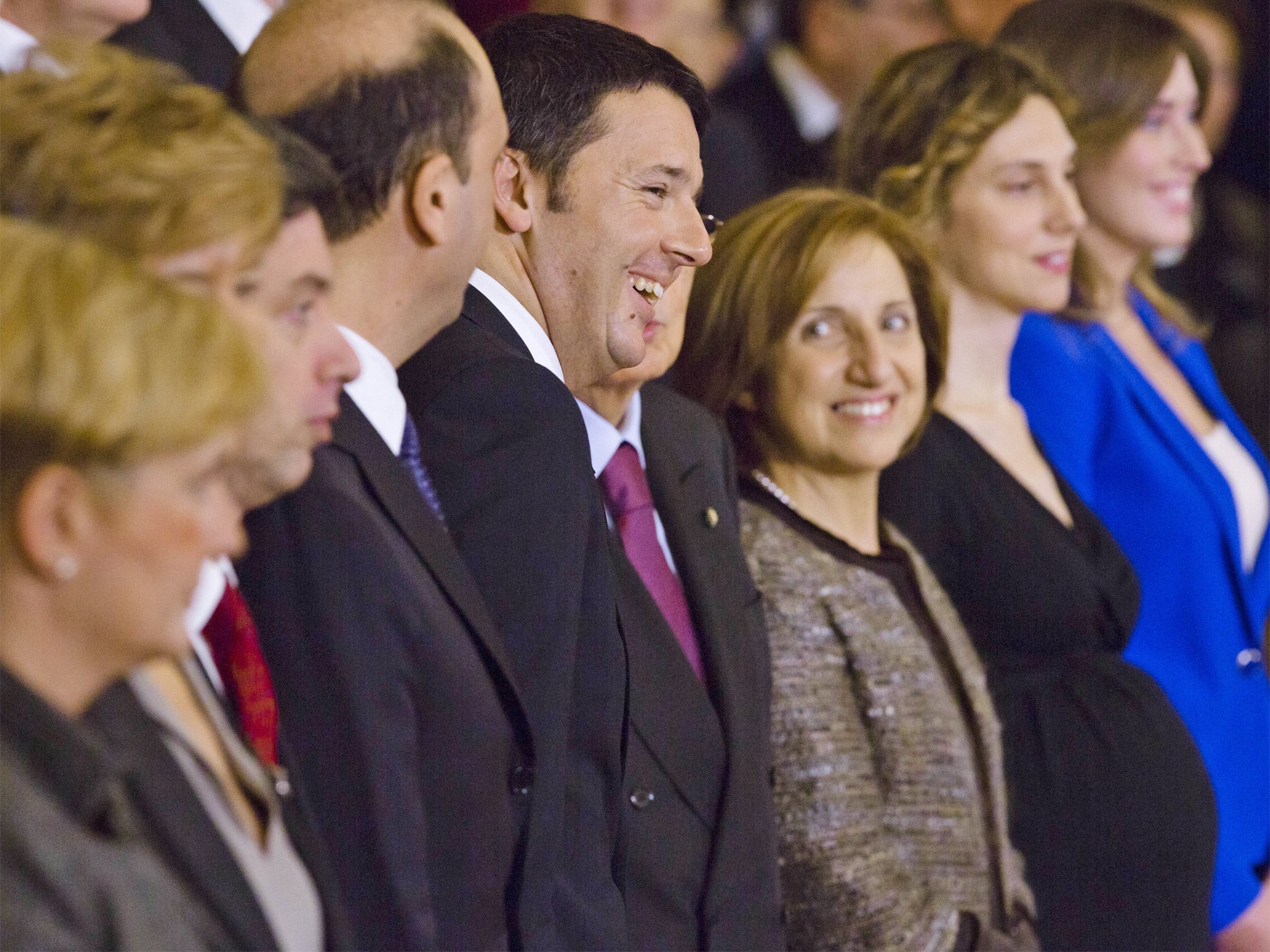A triumph of style over substance? Italy’s new PM, Matteo Renzi, pledges €100m in tax cuts and more generous unemployment benefits, but can he can deliver?
Mr Renzi also promised the repayment of billions of state arrears owed to private suppliers, but did not clarify how he would fund these plans

Your support helps us to tell the story
From reproductive rights to climate change to Big Tech, The Independent is on the ground when the story is developing. Whether it's investigating the financials of Elon Musk's pro-Trump PAC or producing our latest documentary, 'The A Word', which shines a light on the American women fighting for reproductive rights, we know how important it is to parse out the facts from the messaging.
At such a critical moment in US history, we need reporters on the ground. Your donation allows us to keep sending journalists to speak to both sides of the story.
The Independent is trusted by Americans across the entire political spectrum. And unlike many other quality news outlets, we choose not to lock Americans out of our reporting and analysis with paywalls. We believe quality journalism should be available to everyone, paid for by those who can afford it.
Your support makes all the difference.Matteo Renzi, Italy’s youngest and least experienced Prime Minister, who suddenly finds himself in charge of another rag-tag coalition government, does not appear well-placed to make big promises. This hasn’t stopped him pledging tax cuts and investments that could cost over €100bn.
Addressing a bemused Senate, the unelected 39-year-old said on Monday in his informal, straight-talking style that he would introduce “a double-digit reduction” in employment taxes and social security payments. Giorgio Squinzi, the head of the employers’ organisation, Confindustria, said he liked the sound of that. This measure could cost €30bn, however. Mr Renzi also promised the repayment of billions of state arrears owed to private suppliers, but did not clarify how he planned to fund this pledge.
Mr Renzi has talked about investing heavily in education. He told the Chamber of Deputies that Italy must wage “a gigantic battle” to improve education because “the security of our schools is more important than the stability of our accounts”. He also wants to extend unemployment benefits from eight months to two years, and provide new liquidity for small businesses snubbed by Italy’s banking sector.
These promises were enough for him to win a slim majority in the Senate confidence vote, which elevated him to high office, despite plenty of heckling from the populist Five Star Movement – and it is in the upper chamber that his centre-left lacks a majority. The confidence vote in the lower chamber was a given.
Nonetheless, the total cost of Mr Renzi’s pledges is well over €100bn (£82bn), according to the moderate centre-right MP Giuliano Cazzola. “The proposals are shrouded by a curtain so dense as to be worthy of an opium den.”
Mr Cazzola’s comments are significant for other reasons. For one, they were seized upon by the left-wing daily Il Fatto Quotidiano, while Mr Cazzola is now a member of the New Centre Right party headed by Angelino Alfano, the Interior Minister in Mr Renzi’s coalition government. Mr Alfano was today slipping the novice premier advice on bits of paper while he made his speech to the Senate. The hostility Mr Renzi faces on the left and the right, emphasises how politically isolated he is.
Mr Renzi looked almost comically out of place in parliament and earned snooty put-downs from veteran journalists. But the new Prime Minister was more concerned about parading his post-ideological credentials, not once using the words “left”, ‘right” or even “Berlusconi”.
Embarrassingly for Mr Renzi, however, Mr Berlusconi appreciated the discourse: “It’s exactly how I would have spoken,” the disgraced tycoon said afterwards. This no doubt solicited more mutterings from some of Mr Renzi’s colleagues in the Democratic Party (PD).
Some senior figures on the left of the party make little effort to disguise their suspicion of their upstart new premier. The senator Anna Finocchiaro is among them. Today in La Repubblica she noted that in Mr Renzi’s speech “there were no practical details”. Asked if she thought style was more important than substance for Mr Renzi, she replied: “Yes, he’s like that.”

Supporters of Mr Renzi won’t mind their leader being criticised by the political caste – the self-serving, old guard he has set out to dismantle. This is particularly true in Ms Finocchiaro’s case: she was publicly attacked by Mr Renzi last year after it appeared she had used her state-funded bodyguards to help her ferry bits of furniture from Ikea.
Instead Mr Renzi sees his main political enemy as the Five Star Movement of Beppe Grillo. Hence the use of similar language to the movement’s in his Senate speech. Mr Renzi is keen to attract waverers who are sick of Mr Grillo’s dictatorial style. Mr Renzi’s confidantes have said that one of his political priorities in the first 100 days of office is “to bury” Mr Grillo’s movement.
Mr Renzi is also likely to draw on his experience as mayor of Florence to promote successful policies designed to revitalise the economy at a local level. But despite all this, there’s a paradox at the heart of Mr Renzi’s plans: he is an old-fashioned politician. The political scientist Roberto d’Alimonte of Rome’s LUISS University noted that Mr Renzi’s greatest ambition is to turn Italy into a traditional two-party state with stable government.
Hence his controversial backroom deal with Silvio Berlusconi on a new electoral system that seeks to exclude political minnows from parliament, designed to do away with tottering coalitions of the type he is currently leading. Mr Renzi says he can continue to 2018. Most people doubt that. But when the next election comes, Mr Renzi assumes it will be a straight fight between him and the centre-right of Mr Berlusconi.
The big question in the short term is whether Mr Renzi has bitten off more than he can chew. Many observers think so. Other pundits, including the political scientist Lorenzo De Sio, of LUISS University, think that Mr Renzi is too smart not to have some tricks up his sleeve. One such will be co-operating with the centre-right on reforms to open up Italy’s labour markets and deal with 41 per cent youth unemployment. The left of his party might not like the plans.
“But Renzi is a moderate,” said Dr De Sio. “He has never really been someone of the left. To introduce more flexible labour markets he might intend to work with the centre-right. We know he’s not stupid. Why would he set himself up to fail in a short-lived coalition government?” Mr Renzi’s cunning is already well-known. He’ll need all it in the coming months.
Join our commenting forum
Join thought-provoking conversations, follow other Independent readers and see their replies
Comments